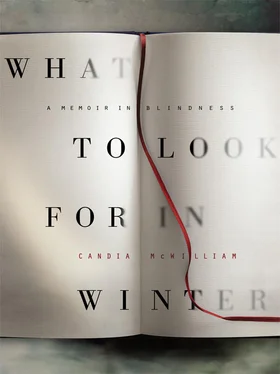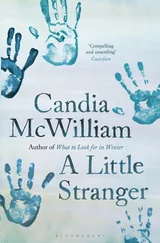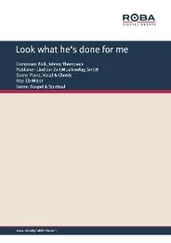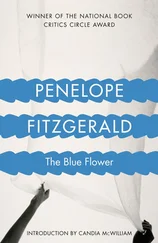The second half of the operation happens six months later, and I thought, at the time seven months ago when I elected to have this operation, that it would be a good idea to have it the day before my fifty-fourth birthday, which is on the 1st of July. The secret notion I had was that I would wake up remade on my birthday. The plain surgical fact is that I shall wake up not capable of walking comfortably for the coming month or so. And blind.
The operation comes in two parts in case of vascular crisis during a macabre reallocation, since the second half of a Crawford Brow Suspension, six months or more after the first, harvests the tendons from behind the subject’s knees and inserts them, umbrella-frame-wise, beneath the forehead and the thickened, stripped eyelids. Some subjects report a subsequent difficulty with closing their eyes. Eye masks, like those used on long plane journeys, have been mentioned as being useful, as have partners, who may assist the subjects at close of day by firmly shutting down the now staring eyes of the once blinkered loved one.
I was chary of making the first part of this memoir and now I find myself writing a second, further to expose the first. It isn’t unlike that eyebrow-stripping procedure: phase one, the first bit of memoir, to toughen up and prepare for deeper digging; phase two, this bit, to do that deeper digging, in order perhaps to see more, and be on the move again. Or to prepare to do these things.
I very much didn’t wish ever surgically to interfere with my face and now am committed to doing it twice in a single year. It wasn’t particularly that I was vain, though I was, but that I didn’t fancy that shared look of terror and conformity that declares cosmetic surgery’s costly untruthful ghost to have passed. And I thought that I was interested by time and its effects upon a face. My children, too, had mentioned their misgivings about cosmetic surgery, the batched moms, the party lines of preservation. And it is expensive and self-necessitating; and I am a Scot and we don’t do that like of thing.
I no longer physically recognise my face. My body is another matter that I would rather leave aside for the moment, which may have been something of the problem all along. Scotswomen make crack dualists; we are at odds with our bodies often, especially if we have early been fingered as being possessed of a brain.
I took the train to Glasgow from King’s Cross. Since not noticing that my own house was on fire till I was nearly smoked, I have been staying at various places in London.
At Glasgow, I was met by the husband of my sister who is not my sister. So many of the relationships in my life are this kind of double negative adding up to a positive. As has been true throughout my life, quite little is what it seems, though much feels straightforward. I think this not unusual for people who make things.
I described earlier how I subtracted myself from home in my teens and added myself to the Howards in the Hebrides. Each of these islands is geographically, culturally and linguistically identifiably its own place. Smallness does not wear away individuation; rather the opposite.
I am here now, on the island of Colonsay, the place in the world where I borrowed a second childhood. I just sort of sank out of one life and emerged into another. It was not a kind thing to do. It may have set a pattern of which I cannot be proud and that my blindness may have given me the insight to break at last.
I’m renting a flat in the big house where we were children and where I learned, if I learned, to share and transmit. This flat is made from rooms that were once nursery bedrooms; the flat’s sitting room was the bedroom where my not-sisters Caroline and Katie ate Eno’s Fruit Salts off their fingers in bed, and on the wall as he ever was is an engraving of Sir Wm Hamilton, Bt, Professor of Logic at the University of Edinburgh, published, as it happens, on 4 May 1857. Today is 4 May. I began this chapter on the 1st.
Next to Sir William is a coloured map of the Western Isles of Scotland, done into the Latin as befits a Scots nursery: ‘ Aebudae Insulae, sive Hebrides, quae Scotiae ad occasum praetenduntur, illustratae et descriptae de Timotheo Pont . Colonsay appears, lying on its side as is the whole of the West Coast, preserving the modesty of the usually incontrovertibly (though docile) phallic Mull of Kintyre, under the cursive word ‘Collonsa’. The part of the island where this house would be built bears the label ‘Killouran’. Oransay, the small island off Colonsay, appears to be designated ‘Gruonsa’, though that ‘G’ may be a ruptured ‘O’.
The bathroom of the flat contains a small modern plastic bath that just holds me. Once, in its place, was a cast-iron bath that held all six of them and me, with a heavy steerable cylindrical contraption between the taps that was the plug. The bath (and all other) water in those days came off the hill and was the colour and flavour of peat. Now it is clear, though it still comes off the hill down from the loch above the house.
My brother Alexander who is not my brother is in charge here now, though his father, whom I call Papa, as all his children do, is completely alive. My not-sister Katie is Alexander’s assistant and right hand and her husband William is woodman, dustman, playwright, diplomat, angle-grinder, freight-sorter, mandatory representative non-native at community meetings, and maker of vital connection. That is he takes life and rebags its stuff into packets that people can enjoy and be fed by. The blindworm boredom dare not come near him.
I have come here to recuperate in advance of whatever comes next and to allow to settle the furious ineffectual seething of my inward life of this last year, and of too many of those years that preceded it. To some extent, too, I am getting myself, and the problem I constitute, out of the way. Where do you put a blind mother who falls over quite a lot and is not yet old enough to fold away for the winter with the barbecue and the swimming towels? It is I, not the children, who think like that, I know, and it’s no help to anyone.
Upstairs a family who have rented a flat in what used when we were young women to be called the bachelors’ corridor are preparing their tea. The father is talking. I cannot hear his words. It is not unusual for families to rent an annual holiday on the island over the whole transit of the raising of a family, whose progress may be followed through those irresistibly voyeuristic and eventually shaming comments books that are a feature of rental property. One is ashamed because one hasn’t recreated the idyll recorded by some family more ideal, better at spotting otters, happier within itself, than one’s own.
Or maybe that’s me, who have been playing at families all along, with deadly seriousness and an eye on the competition because I’ve so little idea of how it works, my darling mother’s surprising disembarkation having left me to improvise.
It is bath time upstairs. A tired young child is grizzling without commitment, nothing that a story will not sort. A radio is on. Water carries radio waves and I can hear enacted conversation, perhaps The Archers , under the living voices with their more convincing scoring for rests.
Outside, after a day of rain, the light is glittery. Through one window of the room where I am slowly typing may be seen the deep garden over and beyond a stream that is itself well beyond three swooping levels of lawn. Two huge trees, Cupressus macrocarpa , twisted by wind and time, hold the last evening sun till late (this is the North). Daisies and blossom smutch, sparkle and powder all the green lawn. Several surprising palm trees announce the passage of Victorian plant-hunters through this lush declivity, actually a geological fault, through Colonsay, this old small rock, nine miles by three, covered with green and surrounded by that light-reflecting north-western sea. I know these sights because my memory provides them, though I can with discomfort and a certain stiff pincering address hold my eyeballs bare to take them in, even if it is not the same as the absorptive wash that soaks all-gathering sight. But it’s something, and I do count my blessings.
Читать дальше











